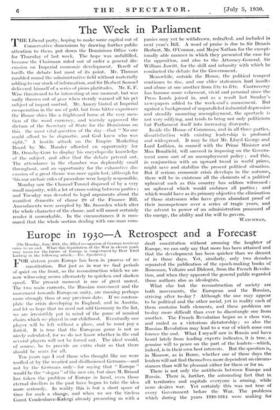The Week in Parliament
THE Liberal party, hoping to make sonic capital out Of Conservative dissensions by drawing further public attention to them, put down the Dominions Office vote for Thursday of last week. The hope was unfulfilled, because the Chairman ruled out of order a general dis- cussion on Imperial economic development. Bereft of tariffs the debate lost most of its point. Mr. Thomas rambled round the administrative field without materially adding to our stock of information, and Sir Herbert Samuel delivered himself of a series of pious platitudes. Mr. E. F. Wise threatened to be interesting at one moment, but was sadly thrown out of gear when sternly warned off his pet subject of import control. Mr. Amery hinted at Imperial co-operation in the use of gold, but from bitter experience the House shies like a frightened horse at the very men- tion of the word currency, and warmly approved the dictum of the Secretary of State for the Dominions on this— the most vital quest ion of the day--that " No one could afford to be dogmatic, and God knew who was right." A hostile attack on the Empire Marketing Board by Mr. Mender afforded an opportunity for Mr. Ormsby-Gore to display his encyclopredie knowledge of the subject, and after that the debate petered out. The attendance in the chamber was deplorably small throughout, and an opportunity for the exhaustive dis- cussion of a great theme was once again lost, although for this our archaic rules of procedure were largely responsible.
Monday saw the Channel Tunnel disposed of by a very small majority, with a lot of cross-voting between parties ; and Tuesday was devoted to legal arguments about the manifest demerits of clause 29 of the Finance Bill. Amendments were accepted by Mr. Snowden which alter the whole character of the clause, and will amost certainly render it unworkable. In the circumstances it is rum- oured that the whole section dealing with one-man corn- panics may yet be withdrawn, redrafted, and included in next year's Bill. A word of praise is due to Sir Dennis Herbert, Mr. O'Connor, and Major Nathan for the except- ionally able manner in which they presented the case for the opposition, and also to the Attorney-General, Sir William Jowitt, for the skill and urbanity with which he conducted the debate for the Government.
Meanwhile, outside the House, the political tempest continues to rise, and our elder statesmen hurl insults and abuse at one another from fete to fete. Controversy has become more vehement, vivid and personal since the Press Lords joined in, and as a result last Sunday's newspapers added to the week-end's amusement. But against a background of unparalleled industrial depression and steadily mounting unemployment, the spectacle is not very edifying, and tends to bring not only politicians but Parliament itself into increasing disrepute.
Inside the House of Commons, and in all three parties, dissatisfaction with existing leadership is profound and widespread. It may be that Mr. Lloyd George and Lord Lothian, in council with the Prime Minister and Miss Bondfield, will succeed in imposing on the Govern- ment sonic sort of an unemployment policy ; and this, in conjunction with an upward trend in world prices, might save and stabilize the present political situation. But if serious economic crisis develops in the autumn, there will be in existence all the elements of a political upheaval such as this country has seldom witnessed an upheaval which would embrace all parties ; and which would have as its primary objective the elimination of those statesmen who have given abundant proof of their incompetence over a series of tragic years, and the advent to power of an administration possessed of the energy, the ability and the will to govern.
WATCHMAN.










































 Previous page
Previous page